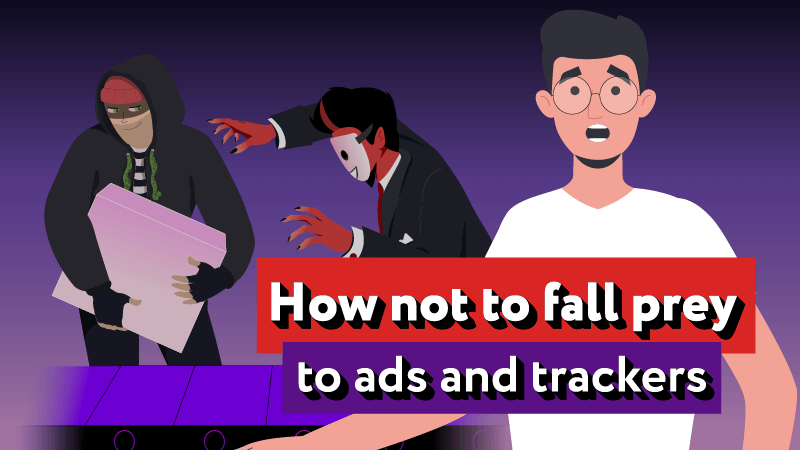Anti-Tracking Apps and Software: the features you need the most
There are some trends in this digital era that should be watched with special attention, because they impact the society too much and with unexpected effect. Like, for example, commercial ads influence the way people think and react no less, and sometimes even more than social adverts derived from those. This concerns ads in the Internet too, make no mistake.
It takes some skill for the advertisements to hit the bullseye with the client, but one of the key factors is the right targeting. To achieve it advertising agencies used all sorts of time-consuming means like questionnaires, the answers to which give lots of useful data, but demand serious effort to collect and analyse it. So in the current time and age there are much faster (and cheaper!) ways to achieve much the same result: just get yourself a program that will do it all.
We here fight with ads, yet this article tackles tracking - the issue that goes hand in hand with actual advertising and borderlines online privacy, which is another important part of the online environment.
We assume that it’s better to know the general idea of how tracking and anti-tracking works and what can be done at all before doing whatever possible to avoid it. Making an informed choice on how to block tracking when you go online seems a sound strategy. So let us dive into a bit of theory before choosing the best anti tracking software.
Know thy enemy. Web tracking - what is it exactly, who does it and why?
Tracking is roughly an all-encompassing process of data collection which is done both by small virtually "no-name" agencies and by big players of the digital industry (you know their names - Google, Facebook etc.) and it is done with the sole purpose to better sell you whatever it is that needs selling.
Every person working on the Internet leaves invisible footsteps: counters built into websites gather information about the user's IP-address (and, therefore, about their current location), their browser version, operating system, screen resolution, extensions and lots of other data. A site can mark your browser with cookies to gather your statistics, save your settings, or automatically identify you upon a repeat visit. To safeguard data and protect privacy one needs to uncheck many checked boxes within the default settings of their browser and consider installing special software on their device - and that would be a tracking blocker.
What tracking does is mostly common knowledge, but sometimes internet users don't really think there is something serious or noteworthy at all behind this term. Until the result of such data collection hits them, that is.
There are tons of examples and real stories on how tracking and retargeting online ads that result from it ruined many a surprise, or accidentally revealed sensitive private information. We even compiled a small digest in our very own
blog some time ago.
Tracking, as a rule, is done by inevident methods and the majority of Internet users simply doesn't notice. Companies of different scale use small bits and pieces of code (cookies), to find out all that is legally possible about you and more importantly about your browsing habits. This info is more frequently than not sold to big advertising companies. Based on it they create a customer profile - and whoa, all of a sudden you get bombarded by all sorts of ads seemingly out of nowhere. The scarier part is that a considerable percent of those ads seem quite accurate. However, mostly we resent tracking because the retargeted ads we get afterwards are seriously annoying and invasive.

There is another side to the tracking coin - one small breach in the security of data storage in any data collecting company can (and very likely will) result in data theft. And then hundreds and thousands user profiles along with passwords, emails and other sensitive information will get into the wrong hands. There have been several highly publicised cases of careless data handling and uncovered unauthorised data collecting, we published some of them in our blog
here and
here, just for example. So it's no wonder people are searching for the ways to block tracking on their devices, both portable and less so.
What to do to prevent tracking, when you can't crawl under a rock and hide?
As was mentionned above, an anti-tracking app or program can protect your data and privacy in most of the cases. Let's see what such type of apps or browser extensions can do to keep you as much under the radar as possible.
What an anti-tracking app can do for you:
Configure Users-Agents (browsers and other programs), so that they resist tracking as much as they can by:
Hiding your search queries. When accessing the website from search engines like Google, Yahoo etc. the search query better be hidden.
Sending Do-Not-Track header. Sending Do-Not-Track (DNT) HTTP header to accessed websites requires web software to turn off tracking of your actions.
Removing X-Client-Data header from HTTP requests. Prevents Google to transmit Chrome's version and information on changes along with requests to Google domains (such as Double Click and Google Analytics).
Deleting third-party cookies. Websites can save information about you and your preferences using cookies – for example, they store the chosen language, the location or even products in your shopping cart. When you visit the website again, your browser delivers back the cookies attached to that website, which makes it possible to “rememeber” your data. Third-party cookies are those integrated by a website that is not the one you are viewing currently. For example, cnn.com can have a Facebook “Like” widget on its' page. This widget will intergrate a cookie that can be analysed by Facebook later on. Some advertisers set such cookies to track what other sites you go to where their ads are present.
Deleting first-party cookies. It’s useful in some specific cases, but in general we do not usually recommend it as it may seriously disrupt the work of certain sites.
Disabling cache for third-party requests. When the browser makes request to a page, the server attaches an ETag to it, which the browser then uses to cache the information. Upon consecutive requests it delivers the ETag to the corresponding server, thus informing it of the visitor’s identity. When the site files stay cached, the ETag is sent every time your browser addresses this site. If the site has content embedded from another server (e.g., an image or iframe), that server can also track your activities without your knowledge.
Blocking WebRTC. WebRTC (Real Time Communications) is a technology that allows communicating and data transferring directly between browsers and apps. It can inform others about your real IP address even if you are using a proxy or VPN. Still, blocking WebRTC can interfere with the work of some browser applications, such as messengers, chats, cinemas, or games.
Blocking Push API. Push API makes possible servers to deliver messages to web applications no matter the browser status. That means you may see notifications from numerous websites even if your browser is hidden to tray or not launched. Blocking browser Push API helps to avoid that completely.
Blocking Location API. This method is about prohibiting the browser from sending GPS data that could be used to define your location and to alter your search results or otherwise interfere with your web experience.
Hiding Referer from third-paries. Referer is one of HTTP headers for browser-to-server request. It contains the URL of request source. If you proceed from one page to another, Referer will store the URL of the initial page. The server is often equipped with software that analyzes Referer and extracts various information from it. Hiding the current website from third-party sites by changing the HTTP header is a good way to avoid it.
Hiding your User-Agent. When you visit a website, your browser sends information to the server. Basically, it's a text line that is a part of an HTTP request that starts with “User-Agent:”. It usually contains the name and version of the browser, operating system, and language settings. Modifying that data is useful for data protection.
Hiding your IP address. It's one of the most obvious things to do, when you want to protect your data.
Allow you to use different filters, especially:
Ad blocking filters, because many ads don’t just disrupt your web experience by uncontrolled appearance, but also gather your personal data.
We hope that all this information wasn’t too much for a first glance at protection against web tracking. We’ll be very happy, if this knowledge will help you find the best way to stop tracking and keep your data and online activities private.
On AdGuard's behalf we can offer you carefully designed anti-tracking apps for all platforms that will protect your privacy by doing everything we mentioned above.
AdGuard for Windows currently presents the fullest anti-tracking functionality, packing a whole separate “Stealth mode” module for that purpose.
AdGuard for macOS is equipped with strong adblocking features and privacy protection module aided by our own Spyware filter (present in AdGuard for Windows as well).
AdGuard for Android recently updated to version 3.0, offers system wide privacy protection, that’s the best known way to block all sorts of tracking on Android devices, and of course tracking protection for Chrome is included.
AdGuard for iOS provides the most advanced and effective anti-tracking features in Safari browser.
Don't forget that nowadays privacy protection needs careful attention everytime you go online, due to many hidden catches around the Web. In case you choose our help, rest assured, we are doing our best. Be safe, block tracking!











